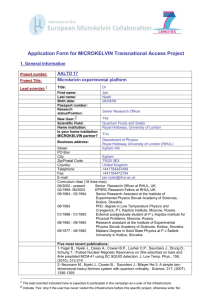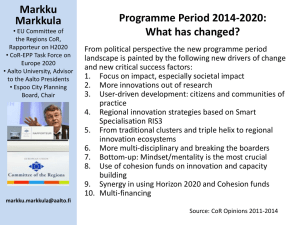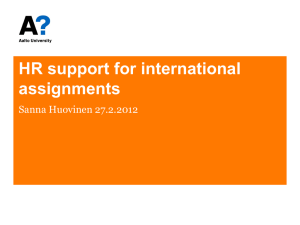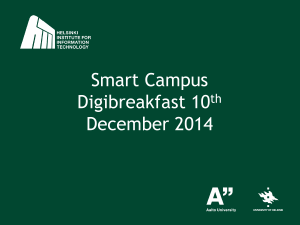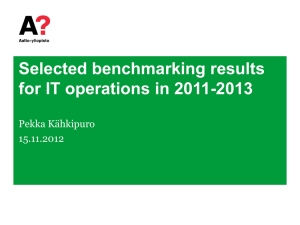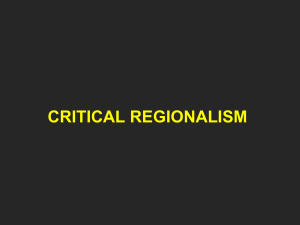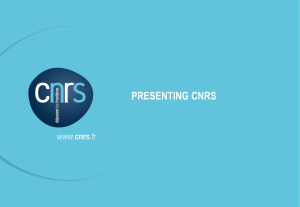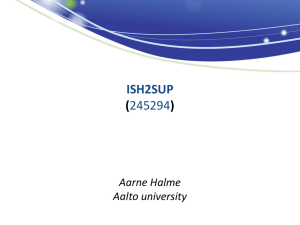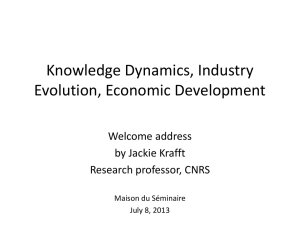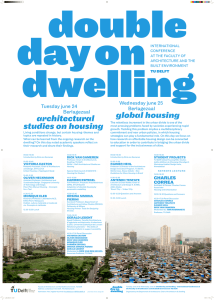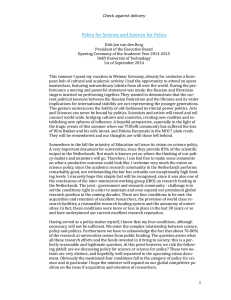Report on Transnational Access Activities and JRA2
advertisement
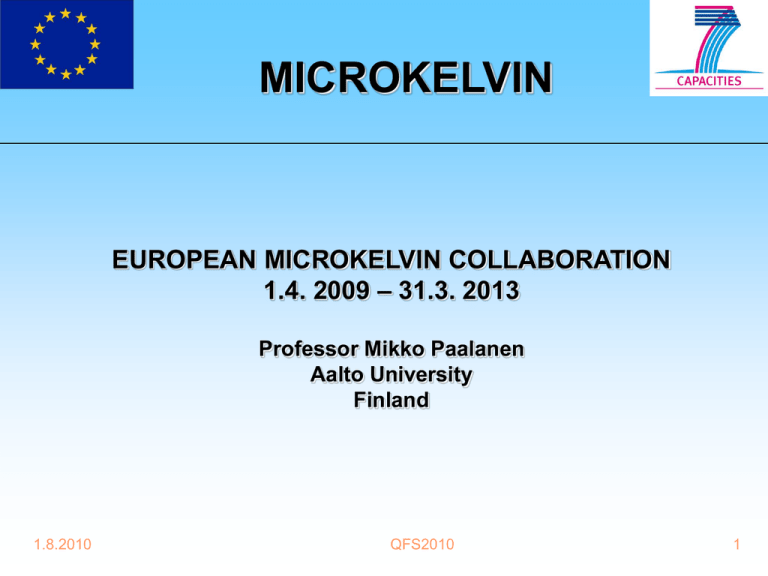
MICROKELVIN EUROPEAN MICROKELVIN COLLABORATION 1.4. 2009 – 31.3. 2013 Professor Mikko Paalanen Aalto University Finland 1.8.2010 QFS2010 1 MICROKELVIN EU-funded network of 12 European low temperature laboratories FP7 Capacities Specific Programme Research Infrastructures EU Call INFRA-2008-1.1.1 Bottom-up approach: Integrating Activities in all scientific and technological fields ~150 applications 29 funded 1.8.2010 QFS2010 2 MICROKELVIN PARTICIPATING INSTITUTE SCIENTIFIC REPRESENTATIVE 1. Aalto University 2. Centre National de la Recherche Scientifique, Grenoble 3. Lancaster University 4. Ruprecht-Karls-Universitaet Heidelberg 5. Royal Holloway and Bedford New College 6. Scuola Normale Superiore di Pisa 7. Ustav Experimentalnej Fyziky Slovenskej Akademie Vied 8. Universitaet Basel 9. Technische Universiteit Delft 10. BlueFors Cryogenics 11. Universiteit Leiden 12. Physicalisch-Technische Bundesanstalt, Berlin 1.8.2010 QFS2010 Mikko Paalanen Henri Godfrin George Pickett Christian Enss John Saunders Francesco Giazotto Peter Skyba Dominik Zumbühl Teun Klapwijk Rob Blaauwgeers Tjerk Oosterkamp Thomas Schurig 3 A! 1.8.2010 QFS2010 4 WEB-SITE http://www.microkelvin.eu/ 1.8.2010 QFS2010 5 European Commission MICROKELVIN Management structure General Assembly Advisory Board NA-TEAM Coordinator Dissemination Committee Project coordinating person Management Committee JRA-TEAM Coordinator NA1 Activity NA1 1.8.2010 Management Office Project coordinating person Administrator Web-officer Legal advisor TA-TEAM Coordinator Selection Panel Activity JRA1 Activity TA1 Activity NA2 Activity JRA2 Activity TA2 Activity NA3 Activity JRA3 Activity TA3 Activity NA4 Activity JRA4 Activity QFS2010 6 MICROKELVIN Activities and budgets TOTAL BUDGET 5 396 177,40 € (EU-funding 4 199 988,50 €) MANAGEMENT NA1: Managing MICROKELVIN Collaboration (Tentative budget 260 800 €) NETWORKING ACTIVITIES (Tentative budget 779 680 €) NA2: Coordination of transnational access NA3: Knowledge and technology transfer NA4: Strengthening European low temperature research TRANSNATIONAL ACCESS ACTIVITIES (Tentative budget 1 290 897 €) TA1: Access to TKK TA2: Access to CNRS TA3: Access to ULANC JOINT RESEARCH ACTIVITIES (Tentative budget 3 064 800 €) JRA1: Opening microkelvin regime to nanoscience JRA2: Ultralow temperature nanorefrigerator JRA3: Attacking fundamental physics questions by μK condensed-matter experiments JRA4: Novel methods and devices for ultra low temperature measurements 1.8.2010 QFS2010 7 MICROKELVIN TRANSNATIONAL ACCESS ACTIVITIES MICROKELVIN will offer access to microkelvin refrigerators Espoo, Finland Grenoble, France Lancaster, UK 27 visitor-months 27 visitor-months 27 visitor-months 18 users 14 projects 18 users 14 projects 18 users 14 projects MICROKELVIN will open microkelvin regime for nanoscientists AALTO CNRS ULANC AALTO Micronova, Finland 100 visitor-hours 5 users 5 projects MICROKELVIN will support the users of the infrastructure 1.8.2010 Scientific support Logistic and technical support Outreach to new users QFS2010 8 MICROKELVIN TRANSNATIONAL ACCESS ACTIVITIES MICROKELVIN will pay travel and housing expences to the visitors per diem to the visitors to cover their other expences access fee to the host institute (about 9 000 €/visitor-month) Access fee covers 1.8.2010 rent of the facility salaries of the support personnel consumables QFS2010 9 MICROKELVIN TRANSNATIONAL ACCESS ACTIVITIES Selection Panel Mikko Paalanen (chair), Henri Godfrin, George Pickett, John Saunders, Peter Skyba, Jan Kees Maan, Per Delsing, Paul Leiderer and Rudolf Gross Selection Criteria 1.8.2010 The accepted experiments have to represent excellent science with unique goals. They have to be technically feasible for the available instruments in our facilities. Scientific and technical progress is expected. Preference is given to first time users from countries lacking low temperature facility. Special attention will be paid to new EU-countries and young starting professors. QFS2010 10 AALTO Low Temperature Laboratory EQUIPMENT OFFERED FOR ACCESS 1) 2) 3) 4) 5) a rotating cryostat with a 300 K base temperature a stationary cryostat with a 10 K base temperature 2 cryostat with 20 mK base temperature 2 cryostats with 20 mK base temperature, 24 hour cool down time to 100 mK temperature, and 0-10 GHz range for high frequency experiments magnetometer model MPMS 5T (Quantum Design), for fast susceptibility, magneto- and Hall resistance measurements at 1.6 - 400 K temperatures and 0 - 5 Tesla fields. SUPPORT PERSONNEL 2 technicians working in the machine shop 1 technician delivering the cryoliquids 1 chief engineer in charge of the cryohall and the semi clean room 1.8.2010 QFS2010 11 CNRS GRENOBLE Institute Néel EQUIPMENT OFFERED FOR ACCESS 1. The ultra-low temperature dilution refrigerator and nuclear demagnetisation DN1 (100 μK), equipped with two different nuclear stages (Lancaster-type and lamellar type) 2. The ultra-low temperature dilution refrigerator and nuclear demagnetisation DN2 (100 μK – presently being installed - available end 2009) 3. The ultra-low temperature dilution refrigerator and nuclear demagnetisation DN3 (100 μK available at the end of 2009 in the Canfranc underground site (LSC) for experiments requiring good cosmic-ray shielding. 4. The high cooling power and very low temperature dilution refrigerator DR1 (T < 5 mK) 5. The very low temperature pulse-tube cooler based dilution refrigerator PT-DR3 (T < 8 mK) 6. The dilution refrigerator based 50 mK-STM facility, 7. The dilution refrigerator based 100 mK-micro-SQUID facility, 8. Access to the thermometric platform, to the low-field continuous and pulsed NMR spectrometers, and ancillary equipment. SUPPORT PERSONNEL 3 technicians 1 chief engineer 2 senior scientists DR1 1 scientist CR2 1.8.2010 QFS2010 12 LANCASTER UNIVERSITY Ultralow Temperature Laboratory EQUIPMENT OFFERED FOR ACCESS 1. 2. 3. Cryostat 4 cools superfluid 3He down to 100 μK Cryostat 2 cools superfluid 3He down to < 80 μK, copper down to 10 μK Cryostat 5 cools superfluid 3He down to < 80 μK, copper down to 6 μK SUPPORT PERSONNEL 2 technicians 1 senior scientists 1.8.2010 QFS2010 13 MICROKELVIN Transnational Access Activities ACCEPTED PROJECTS 30.6. 2010 TA1 Aalto: TA2 CNRS: TA3 Lancaster: 11 projects 4 projects 2 projects COMPLETED PROJECTS 30.6.2010 TA1 Aalto: TA2 CNRS: TA3 Lancaster: 8 projects 1 project 2 projects 11.6 mo 1.3 mo 2.0 mo http://www.microkelvin.eu/project-activities-transnational.php 1.8.2010 QFS2010 14 Joint Research Activity 2 (JRA2) Ultralow temperature nanorefrigerator AALTO, CNRS, RHUL, SNS, BASEL, DELFT Activity leader: Professor Jukka Pekola Objectives 1. Thermalizing and filtering electrons in nanodevices 2. To develop an electronic nano-refrigerator that is able to reach sub-10 mK electronic temperatures 3. To develop an electronic microrefrigerator for cooling galvanically isolated nanosamples AALTO and CNRS: SNS: BASEL DELFT and RHUL: 1.8.2010 nanorefrigeration by superconducting tunnel junctions coolers based on semiconductors (quantum wires and dots) very low temperature thermalization and filtering end users of the nano-coolers QFS2010 15 Task 1: Thermalizing electrons in nanorefrigerators (AALTO, CNRS, BASEL) Ex-chip filtering: Sintered heat exchangers in a 3He cell Lossy coaxes/strip lines, powder filters, ... W. Pan et al., PRL 83, 3530 (1999) On-chip filtering: Lithographic on-chip filtering A. Savin et al., APL 91, 063512 2007 1.8.2010 QFS2010 16 Task 2: Microkelvin nanocooler (AALTO, CNRS, SNS) Aim is to develop sub - 10 mK electronic cooler Normal metal – superconductor tunnel junctions-based optimized coolers (AALTO, CNRS, DELFT) Towards lower T: Improved quality of tunnel junctions Thermometry at low T? Lower Tc superconductor Quasiparticle relaxation studies in sc and trapping of qp:s Quantum dot cooler (SNS) V12 V11 V22 V13 V21 V23 GaAs 2DEG Reservoir Drain VD QD1 Source VS QD2 V31 V32 V33 QD3 Therm. lead VTh 1.8.2010 QFS2010 GaAs 2DEG Metallic split gates 17 Task 3: Development of a 100 mK, electronically-cooled platform based on a 300 mK 3He bath (AALTO, CNRS, RHUL, DELFT) Commercial, robust SiN membranes (and custom made alumina) as platforms (AALTO) Epitaxial large area junctions (CNRS) Optimized junctions (e-beam and mechanical masks) RHUL and DELFT use these coolers for experiments on quantum devices 1.8.2010 QFS2010 18 Deliverables Task 1 D1: Analysis of combined ex-chip and on-chip filter performance (18) D2: Demonstration of sub-10 mK electronic bath temperature of a nanoelectronic tunnel junction device achieved by the developed filtering strategy (30) Task 2 D3: Analysis of sub-10 mK nano-cooling techniques including (i) traditional N-IS cooler with low Tc, (ii) quantum dot cooler (24) D4: Demonstration of sub-10 mK nanocooling with a N-I-S junction (48) Task 3 D5: Demonstration of 300 mK to about 50 mK cooling of a dielectric platform (36) D6: Demonstration of cooling-based improved sensitivity of a quantum detector (48) 1.8.2010 QFS2010 19 MICROKELVIN JRA2 kick-off Ystad Sweden June 24, 2010 List of participants: AALTO: SNS: DELFT: CNRS: BASEL: RHUL: 1.8.2010 Jukka Pekola, Matthias Meschke, Juha Muhonen, Simone Gasparinetti Francesco Giazotto, Panayotis Spathis,Orlando Quaranta Eduard Driessen, Nathan Vercruyssen Hervé Courtois, Laetitia Pascal, Hung Nguyen Dominik Zumbuhl Giovanna Tancredi QFS2010 20 Achievements by July 2010 Task 1: AALTO: On-chip filtering suppresses significantly leakage and dissipation in NIS junctions – theoretical model developed and experimental demonstration performed BASEL: Sophisticated microwave ex-chip filtering demonstrates electron temperature of 18 mK Task 2: SNS: Quantum dot thermometry and thermal transport measurements performed AALTO: AlMn as a normal material tested for cooler purposes CNRS: Electron and phonon temperatures measured separately Task 3: CNRS: Epitaxial large tunnel junction process under way AALTO: Coolers on silicon nitride membranes produced, cooling power degraded in the first experiments by poor efficiency of the cold finger DELFT: Kinetic inductance detector fabricated and demonstrated (performance improvement by cooling) on a platform produced by AALTO RHUL: Tests of Josephson junctions on cooler platforms (together with AALTO) 5 or more articles on JRA2 either published, submitted or under preparation for publication 1.8.2010 QFS2010 21 ACKNOWLEDGEMENT Please! Acknowledge the support of the European Community — Research Infrastructures under the FP7 Capacities Specific Programme, MICROKELVIN project number 228464. 1.8.2010 QFS2010 22 INDIVIDUAL PROPERTY RIGHTS 1.8.2010 All MICROKELVIN employees must have an IPR argreement with their host Institute! QFS2010 23 MICROKELVIN REPORTS AND REVIEWS Periodic reports: 30.11. 2010 30. 7. 2012 Final Report 31.5. 2013 Mid Term Review 30.9.2011 1.8.2010 QFS2010 24 MICROKELVIN USERS MEETINGS Users Meeting 1: 15. – 16. 10. 2010, Helsinki Users Meeting 2: August 2012, Lancaster In connection of QFS2012? 1.8.2010 QFS2010 25
